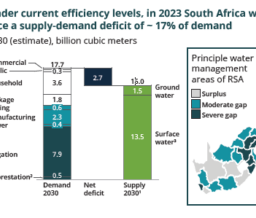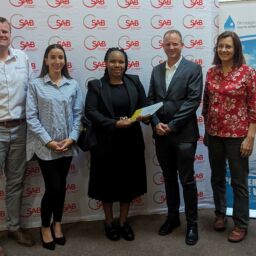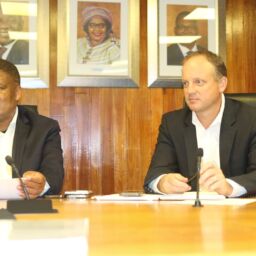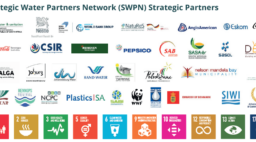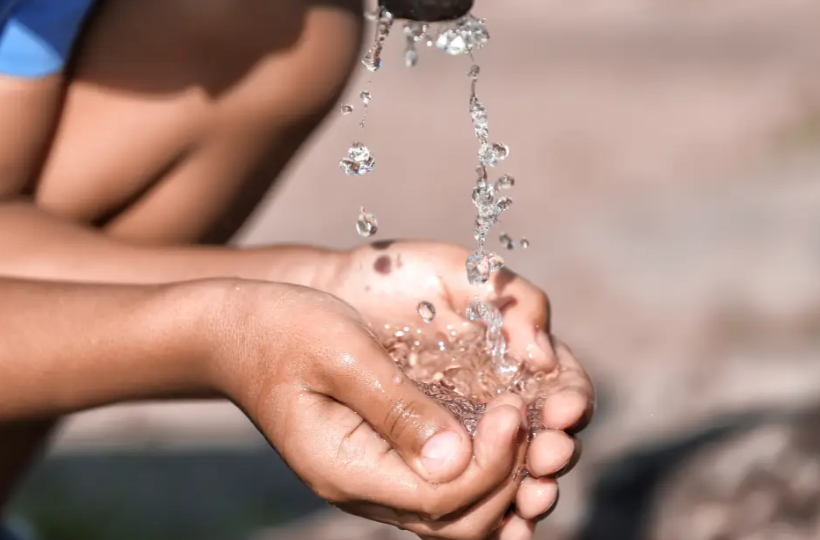
South Africa’s water challenges are many. It is one of the 30 driest countries in the world, with prolonged droughts due to the climate crisis exacerbating the problem. We also face issues such as ageing and inadequate water infrastructure, unsustainable water use, contamination by sewage and bacteria, and poor protection of water source areas.
In September, Trialogue partnered with the Rand Water Foundation to host a webinar on how to strengthen water security in the country. Panellists included Mashudu Funzani, Programme Manager: Water, Sanitation and Hygiene (WASH) at the Rand Water Foundation, Peter Varndell, Chief Executive Officer of the NEPAD Business Foundation (NBF) that hosts the Strategic Water Partners Network (SWPN), and Justin Smith, Head of Business Development at WWF South Africa.
CSI support for water and sanitation
Most companies address water issues through their core business rather than their corporate social investment (CSI) strategies.
Research published in Trialogue’s Business in Society Handbook 2023, showed that water and sanitation received 29% of CSI funding in the housing and living conditions development sector, while water conservation and wetlands management received 19% of investment in the environmental sector. These two sectors received only 4% and 3% of total CSI spend in 2023, respectively. However, given our current water challenges, companies may want to consider increasing their investment in the water sector.

Rand Water Foundation’s interventions
The Rand Water Foundation aims to improve rural and semi-rural communities’ access to clean, safe drinking water by drilling boreholes, installing water storage tanks, communal taps, water purification systems and more, while also attending to domestic water leaks. It helps to build the capacity of nonprofit organisations (NPOs) and small, medium and micro enterprises (SMMEs) to assist in its broader goals, such as reducing leaks and educating communities about water use and payment for services.
The current water crisis in Gauteng has led to the development of the Platforms for a Water Secure Gauteng, whereby the National Department of Water and Sanitation works closely with Rand Water and the Gauteng municipalities to ensure more reliable water supply.
The Dashboard for a Water Secure Gauteng provides all sectors with a clear view of the water situation as well as progress made in alleviating the crisis. The Rand Water Foundation is currently partnering with the NEPAD Business Foundation and other stakeholders to undertake retrofitting in Alexandra to save water. Such initiatives have proved fruitful in the past – for example, domestic leaks in the Rand West City Local Municipality have been fixed by retrofitting more than 6 000 households, thereby reducing water losses by 13%. In Emfuleni, more than 10 00 households have been retrofitted, saving 15% of non-revenue water losses. The foundation has trained and employed 240 young people to assist with infrastructure upgrades. It also works with youth-led NPOs on water supply and sanitation at schools, as well as wetlands rehabilitation and alien vegetation removal.
Funzani said CSI programmes can assist by focusing on maintaining and developing infrastructure in under-resourced and rural areas, funding boreholes and water distribution systems, and helping Rand Water scale its sanitation initiatives.
The NEPAD Business Foundation’s interventions
The NEPAD Business Foundation holds the only government and private-sector-led multi-stakeholder water partnership in South Africa, the Strategic Water Partners Network (SWPN). Launched at the World Economic Forum over a decade ago, the SWPN’s goal is to close the existing supply-demand water gap, in alignment with the needs of the Department of Water and Sanitation (DWS).
The network functions as a neutral convening platform and its approach is similar to Business for South Africa, which set out to bring existing private sector exercise to bear on the energy and logistics crises facing South Africa. Its Water Stewardship Working Group shares information with all water sector bodies, and its core task team works closely with municipalities on non-revenue water projects.
The SWPN’s first intervention was to work with the DWS on a No Drop Programme, which measures the performance of the water service authorities by conducting audits pertaining to water use efficiency. “Non-revenue water is a key enabler as this is where you can plug gaps in operational budgets and recover revenue,” Varndell said.
In 2023, the No Drop Report indicated that non-revenue water made up 47.5% of the national water balance, of which 40% was water losses – significantly below global best practice, which puts non-revenue water at around 15-20%. Arresting the steady decline is vital.
In Polokwane, the SWPN is working closely with Anglo-American and South African Breweries – both big water users – to help improve the city’s water security. A non-revenue water strategy and business plan for the city has been developed, which aids in replacing bulk meters and servicing and installing pressure-reducing values, amongst other benefits. Performance-based contracts – standard templates and guidelines for use by municipalities – have also been put in place. Additionally, the partnership has identified funding opportunities for the municipality to enable it to raise a full budget for non-revenue water. “The interventions paid for themselves in just three months, which is a good return,” Varndell pointed out.
A similar project was rolled out in Nelson Mandela Bay during the metro’s recent water crisis. South African Breweries assisted with a similar intervention, the results of which are starting to be seen now. “There is the potential to save about three megalitres of water a day,” Varndell noted.
Varndell said a key lesson learnt has been that one can make a strong business case for non-revenue water projects. One opportunity is to ensure revolving funds drive sustainability, with projects rolled out in phases. “As you complete the first phase, and the value of water savings is accrued, you can refund the interventions,” he said. Varndell added it was not in the private sector’s interest to fund government projects, but there is a huge opportunity to reduce operational risks through non-revenue water projects, improving water reliability in the process.
There is a further opportunity for companies with ESG obligations to become water-neutral. Varndell says projects can help earn water credits that assist with ESG reporting – and because water is a cross-cutting issue, it’s possible to package these projects that support health (working with water demand issues at hospitals), job creation (retrofitting in townships), and more.
WWF’s interventions
The WWF South Africa’s well-known water programmes concentrate on South Africa’s strategic water source areas, particularly key catchments that provide most of our surface water and power two-thirds of our economy. The WWF develops local partnerships in these key areas, working with government, businesses, local communities, traditional leaders and around 20 non-profit organisations and implementing partners to strengthen water resilience.
A common issue across the 22 strategic water source areas is alien invasive plants. Removing these improves water availability in key upper catchments and creates employment opportunities in deep rural communities.
The WWF further helps companies to understand risks and opportunities relating to biodiversity management, within the current global biodiversity framework. It is currently working with around 25 companies that want a better understanding of their water risks, and which areas are priorities for their operations and value chains. “Some companies have replenishment targets, and we work with them to improve ecological infrastructure in the catchments that supply their water,” Smith said. He added that business plays an increasingly important role in developing jobs in this area, including, for example, community-based nurseries and biomass businesses.
Recommendations for companies and nonprofit organisations
Funzani said there were opportunities for a range of stakeholders to address water scarcity comprehensively and sustainably. He adds that companies should identify impactful water management projects that allow them to work closely with local government, communities, NPOs and other businesses. “NPOs and SMMEs are welcome to make applications to Rand Water Foundation – our aim is to scale solutions, build resilience, and ensure South Africa’s water resources are managed efficiently for future generations,” he told the forum.
Varndell said companies and NPOs have distinct opportunities to support municipalities, and it is possible to cross-subsidise operational budget-type projects with CSI opportunities. Companies with water risk can support projects through their CSI, and leverage CSI spend to support job creation, health and other interventions that involve water security.
“Most importantly, there’s the opportunity to make it sustainable by focusing on a non-revenue water opportunity,” he said. “Relatively small contributions can fund the initial phases of projects, with the opportunity to reinvest, which is a great model worth investigating.”
Smith recommended companies look at the connection to their core business or their value chain, while NPOs can consider how to integrate water into other projects and collaborate with partners. “Water is not a competitive area and the partnership space, as an NGO, is critical in trying to solve the challenges we face.”
This article was originally published on the Trialogue Knowledge Hub: https://trialogueknowledgehub.co.za/webinar-from-risk-to-resilience-integrating-sustainable-water-management-into-csi/



